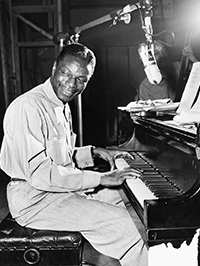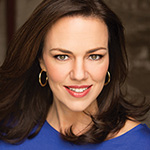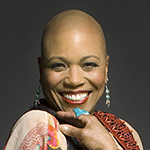May/June 2019
Nat King Cole
by Marilyn Lester
 Jazz pianist and singer Nat “King” Cole, known for his supreme musicality and velvety baritone voice, made an indelible mark in music in his 45 short years. He was born Nathaniel Adams Coles on March 17, 1919 (later dropping the “s” from his name in entertainment billings). When he tragically died on February 15, 1965 from advanced lung cancer, his popularity was at a zenith. He recorded more than 150 singles that charted on Billboard’s Pop, R&B, and Country lists, a record still unsurpassed. His music continues to be popular to this day.
Jazz pianist and singer Nat “King” Cole, known for his supreme musicality and velvety baritone voice, made an indelible mark in music in his 45 short years. He was born Nathaniel Adams Coles on March 17, 1919 (later dropping the “s” from his name in entertainment billings). When he tragically died on February 15, 1965 from advanced lung cancer, his popularity was at a zenith. He recorded more than 150 singles that charted on Billboard’s Pop, R&B, and Country lists, a record still unsurpassed. His music continues to be popular to this day.
At age four Cole was taught to play the piano by his mother, Perlina, a church choir director. He had formal classical piano training, but dropped out of school at age 15 to become a full-time jazz pianist, initially working with elder brother Eddie, a professional bassist. He made his first recording in 1936 and formed the King Cole Trio in 1937 with bassist Wesley Prince and guitarist Oscar Moore. (The name was a riff on the nursery rhyme and reflected the tradition of royalty naming in jazz (e.g., King Oliver, Duke Ellington, Count Basie, etc.)
Cole began singing in 1940 when a club patron demanded a song––so the story goes. With “Sweet Lorraine,” his first hit, recorded in 1940, his career was set in motion. In 1941, Cole’s own composition, “That Ain’t Right,” made it to the charts, followed by his “Straighten Up and Fly Right” in 1944. He began generating hits regularly, including “(Get Your Kicks on) Route 66” in 1946, “There! I’ve Said It Again” in 1947, and “Nature Boy” in 1948. “Mona Lisa” charted at number one in 1950, the same year that another hit, “Orange Colored Sky,” was released. Critics would bemoan that Cole gave up jazz, but in fact, much of his work remained jazz-based. His 1956 album, After Midnight, is entirely jazz.
In 1946 Cole was the first black artist to have a sponsored radio show, the 15-minute program King Cole Trio Time. Yet he encountered racism throughout his career. After purchasing a home in a white neighborhood in1948, he was informed that homeowners there did not welcome undesirables. He said, “Neither do I, and if I see anybody undesirable coming into this neighborhood, I’ll be the first to complain.” In November 1956 he became the first black man to host a television variety program. The Nat “King” Cole Show was
a popular success, but it was short-lived for lack of a national sponsor. Of this, Cole said, “I guess Madison Avenue is afraid of the dark.”
As an actor, Cole appeared in films in the 1940s as a version of himself. Later, he landed character parts, including in the Errol Flynn drama Istanbul and with Gene Barry in China Gate, both in 1957. In 1958 he played W.C. Handy in St. Louis Blues with Eartha Kitt and Cab Calloway. His final appearance was with Jane Fonda and Lee Marvin in Cat Ballou, a film released after his death, in June 1965.
Throughout the 1950s, Cole recorded and charted hit after hit, including songs and albums in Spanish. Even when musical tastes began to change in the 1960s, he still had a number of hits. To remain relevant he recorded a rock-and-roll number, “Send for Me,” which peaked at number six on the pop chart. L-O-V-E, his last album, was recorded in December 1964 as he fell ill; it was released just before his death, peaking on the Billboard charts at number four the following spring. In 1990 Cole was posthumously honored with a Grammy
Lifetime Achievement Award. Among many other honors since his passing: he was inducted into the Down Beat Jazz Hall of Fame in 1997 and the Rock and Roll Hall of Fame in 2000.





